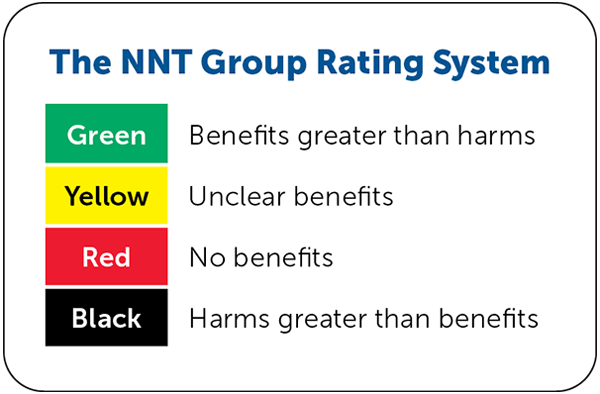
Am Fam Physician. 2018;98(2):117-118
Author disclosure: No relevant financial affiliations

Details for This Review
Study Population: Perimenopausal and postmenopausal women with a mean age range of 48 to 76 years. Patients who took estrogen-only or combined hormone therapy were included.
Efficacy End Points: Reduction in fracture risk
Harm End Points: Mortality, coronary artery disease, cancer (breast, lung, colorectal, endometrial), gallbladder disease, fracture, cognitive function
Narrative: Long-term hormone therapy has been used in perimenopausal and postmenopausal women to treat many medical conditions. As levels of estrogen decrease naturally throughout menopause, women experience an increase in coronary artery disease, cancer, fractures, and many other conditions. This review evaluates the impact of long-term hormone therapy on the incidence of these conditions.
Long-term hormone therapy decreased the risk of all fractures, including hip and vertebral fractures. However, the risks far outweighed the benefits of this intervention. The most striking risk was an increase in the diagnosis of probable dementia in patients receiving combined estrogen/progesterone therapy. Patients had an increased risk of coronary events, venous thromboembolism, breast cancer, gallbladder disease, and death from lung cancer. Patients who received estrogen-only therapy had an increased risk of stroke, but there was no statistically significant difference in the combined treatment group. Estrogen-only therapy showed a decrease in breast cancers at seven years despite an increased risk among all patients included in the study.1

| Benefits | Harms |
|---|---|
| 1 in 42 women avoided a fracture | 1 in 111 women were at increased risk of dementia |
| 1 in 250 women died from lung cancer | |
| 1 in 500 women experienced a coronary event | |
| 1 in 200 women experienced a venous thromboembolism | |
| 1 in 200 women were diagnosed with breast cancer | |
| 1 in 91 women experienced gallbladder disease |
Caveats: The studies included in this review postulated that low hormone levels in perimenopausal and post-menopausal women are the cause of many medical conditions. For most conditions, the studies proved that replacing these hormones actually increased risk. Most patients in this study were postmenopausal (older than 60 years) and from the United States. Participants in the combined treatment arm of the Women's Health Initiative, the largest study included in the review, were an average age of 63 years. Further studies may show different results in younger women; however, the many risks may make continued research in this area unlikely.
For patients at high risk of fractures, physicians should consider the cardiovascular risks, malignancy risks, and cognitive harms before initiating therapy.
This review does not evaluate the effectiveness of hormone therapy in treating the symptoms of menopause. The vasomotor symptoms associated with menopause, such as hot flashes, fatigue, or sleep disturbances, can be debilitating and dramatically affect a patient's quality of life. A patient would likely seek out hormone treatment for these symptoms without knowledge of the associated risks outlined in this study. Furthermore, a perimenopausal woman experiencing these symptoms is likely to be younger than the average age of these participants and may not be able to apply these data to her specific situation. A physician and patient should separately consider the effectiveness of hormone therapy for severe menopause symptoms with these potential harms.
Copyright 2018 The NNT Group (theNNT.com). Used with permission.
This series is coordinated by Dean A. Seehusen, MD, MPH, AFP Assistant Medical Editor, and Daniel Runde, MD, from the NNT Group.
A collection of Medicine by the Numbers published in AFP is available at https://www.aafp.org/afp/mbtn.
